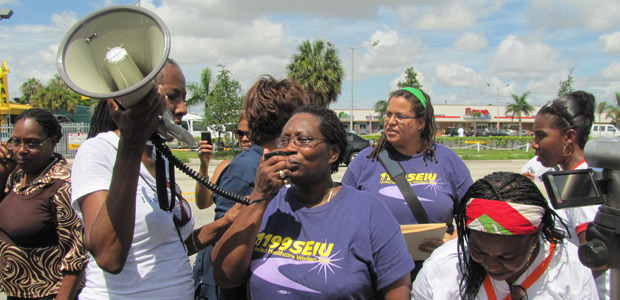1199SEIU Members Rally for Equal Treatment for Haitians in Miami
January 1, 2014
On August 11, 1199SEIU members, including President George Gresham and Executive Vice President Monica Russo, joined 200 activists in front of the U.S. Citizenship and Immigrations Services office in Miami to demand just immigration policies for Haitians.
The protest called for the Department of Homeland Security to immediately enact a Haitian Family Reunification Plan (HFRP) to help Haitians in Haiti and the Diaspora by granting immediate parole in the U.S. to already approved immigration beneficiaries, to halt deportations at this time, and to ensure that TPS for Haitians is extended as long as the humanitarian crisis persists.
The action was sponsored by TransAfrica, Let Haiti Live, the A. Philip Randolph Institute, 1199SEIU, Institute for Justice and Democracy in Haiti, FANM (Fanm Ayisyen Nan Miyami) and Florida Immigrant Coalition,
“We pay taxes and we work hard,” said Ghislaine Bazile, a CNA who works in North Miami. “We want to reunify with our families and be treated equally.” Bazile, who has two sisters and many cousins that she hasn’t seen since 1995, came to Haiti 30 years ago with her father who moved to New York to find work. “We have families that are waiting to come to the United States,” Bazile said. “They don’t have any work, water, healthcare or electricity. My uncle, who took care of me when my father left, died five months ago from cholera. If I could have brought him here to live with me, he would still be alive.”
Although Haiti is in the midst of a dangerous hurricane season and hundreds of thousands of earthquake survivors are still homeless and living in tent cities, the United States is delaying immediate immigration reform that could save lives. Fifty Haitians are slated to be deported back to Haiti where they likely face inhumane conditions during an escalating cholera epidemic. In addition, more than 16,000 minor children and spouses of lawful permanent U.S. residents are in a holding pattern in Haiti, despite the fact that the Department of Homeland Security could quickly allow them parole in the U.S. – not only protecting their lives, but increasing remittances to Haiti during an ongoing humanitarian crisis.
“This isn’t the first time and it’s not the last time we demand justice for Haitians,” said Monica Russo. “It is a crime and a shame that our Haitian brothers and sisters cannot enjoy the same reunification our dear brothers and sisters from Cuba enjoy. We want equal treatment, not divide and conquer.”


